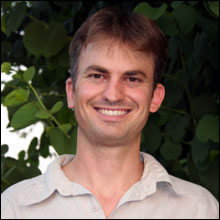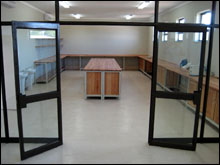SAEON Ndlovu Node advances on its mandate
|
Since arriving at the SAEON Ndlovu node to assume duty as the new Node
Manager on 2 January this year, Tony Swemmer's time has been split
between establishing the "Ndlovu team" in the new offices and as a unit
within SANParks' Scientific Services Division, studying the SAEON
documentation, rebuilding a network of potential collaborators and
familiarizing himself with the "ins and outs" of the administration
systems of SANParks, Ndlovu's host organization.
Tony admits that he has been particularly interested in the procurement processes … as their new offices are badly in need of furniture, décor, and (most importantly) equipment for the large laboratory. In addition to a fully functioning ecological laboratory, Ndlovu is planning to purchase computer work-stations and a node vehicle, paving the way for the hosting of graduate research at the offices.
Partnerships and networks
Tony has begun to re-establishment the network of research and conservation organizations that the previous Node Manager, Dr Dave Balfour initiated. The Node's GIS/ Database Manager, Nikki Stevens had a successful meeting with the Palaborwa Mining Company at the end of last year, which was a first step for SAEON to get involved with their new biodiversity monitoring programme.
Tony gave a presentation at the UNESCO "Kruger to Canyons" Biosphere AGM and collaboration with the biosphere organizing committee, in the form of research facilities and data-sharing, is now on the horizon.
Tony and Dr Bob Scholes of the CSIR will also be collaborating on Dr Scholes' new ecosystem-atmosphere exchange project, the CarboAfrica project. The Node will assist in establishing two sites for a mobile flux tower in the Phalaborwa area, and to contribute to the day-to-day running of the tower.
Connections have been re-established with the ARC Range and Forage Unit, and the WITS Rural Facility, both very important stakeholders in long-term environmental research in the lowveld region. Birdlife Africa recently established an office in Phalaborwa, and discussions are under way regarding collaboration between Ndlovu and the creation of the Kruger to Canyons birding route.
A working relationship has been established with Dr Emma Archer of the School of Geography, Archaeology and Environmental Studies at the University of the Witwatersrand. Tony and SAEON Database Manager Nikki Stevens will be assisting Dr Archer in locating and accessing sites for the ground truthing of satellite imagery, for the purpose of mapping land-use in the lowveld. The results from this work will be of great value to Ndlovu for monitoring land-use change in the region.
Archiving of long-term environmental data
With the assistance of Prof Tim O'Connor, Nikki recently acquired a data set of long-term vegetation monitoring from the Mkuze Game Reserve in KwaZulu-Natal. This officially marks the start of the archiving of long-term environmental data at the Node! The generous donation of a large GIS database of topographic maps by Dr Hennie du Preez, a geographic and environmental information systems consultant, has added a significant chunk of megabytes.
In January, Nikki acquired "Morpho" metadata software, and training, from SANParks's Judith Kruger (also SAEON's Special Advisor on Information Management). Nikki is now ready to create a database of all (previous and current) environmental research in the savanna biome. This formidable task will assist the Node in finding the 'gaps' in terms of monitoring environmental change, and lays the foundation for designing a monitoring programme for the Node. It will also help facilitate external research on specific topics where data is lacking.
Education Outreach set to grow exponentially
Joe Sibiya, Ndlovu's Environmental Education Outreach Officer, has a busy year lined up. The environmental education activities planned for the year include a weekend workshop for educators from local schools, four "Teacher's Tearoom Forums", the National Science Week project (again in collaboration with the Palabora Foundation and even larger than last year's), a job-shadowing project for high school learners, a Winter Camp for selected learners, and a Science Platform Month project that, in conjunction with the Natal Sharks Board, will bring a mobile shark display to Phalaborwa schools. In addition to these awareness projects, a learners monitoring project (in which learners will collect useful environmental data) is in the pipeline…
In between all of this, Joe will be attending and presenting at the 4th World Environment Education Congress, to be held in Durban later this year. Joe's strong relationships with the local schools continue to grow, and already the Node has had learners visiting the new office building as part of Joe's arrangement to provide learners with internet access as a means of assisting them with school assignments related to the environmental sciences.
The Node's outreach programme looks set to grow well beyond the solid foundation laid by SAEON's Education Outreach Coordinator, Sibongile Mokoena, Dr Dave Balfour and Joe over the past two years.













